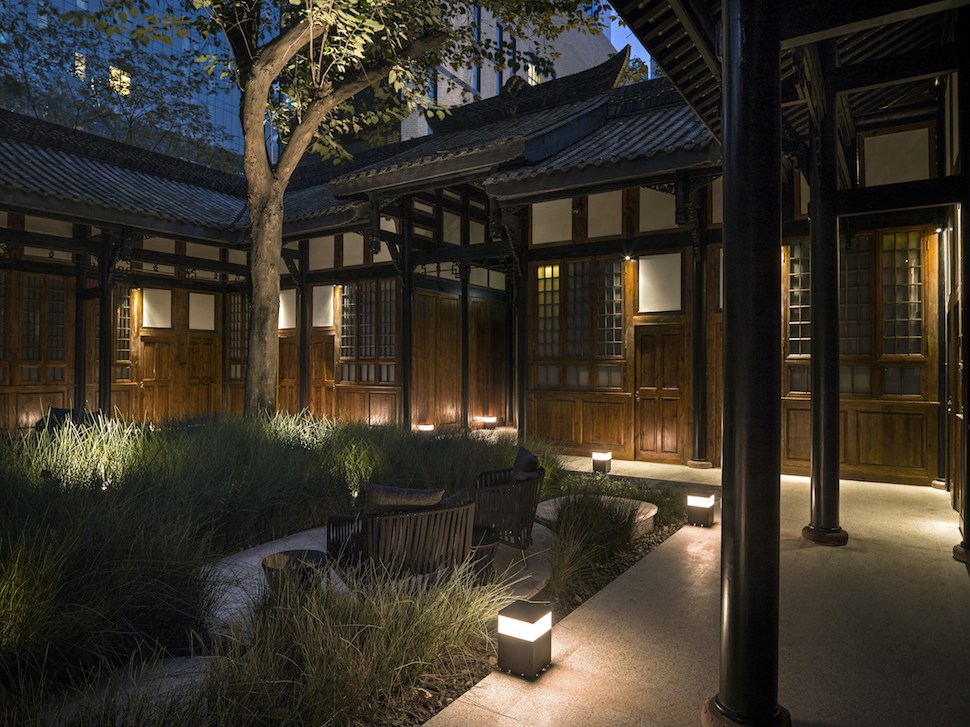
“I am one; who eats his breakfast; gazing at the morning-glories.”
Oddly, it’s Japanese poet, Basho, whose words come to mind when I enter the Mi Xun Spa’s garden, part of The Temple House Hotel, in Chengdu, China’s fourth largest city. Somehow his poem seems like the word-track I need, though, I’d have expected a Chinese poet, like Li Po, to be my guide. I sit beneath a tree in a simple chair, sipping tea, in a former mulberry orchard, a spa space composed from two heritage buildings, steps from a thousand-year-old Daci temple.
Thinking about Basho’s poem, feeling the pure environment around me, I succumb to contentment as the external world disappears, and my internal being awakens. The energy here, redolent with peace, is as powerfully fulsome as organ music, thunder or waterfalls flowing. It electrifies my body, even while calming me to the core. And, that’s before my massage. This location itself is as healing as a shaman’s elixir.
Some places, seem naturally to have an indescribable buzz, one that not only feels right, but that promotes wellness and light. It’s something palpable—like breathing fresh air or swimming in crystalline water.
Space can temper or harm; make us happy or sad; turn us frenzied or listless. It is said that Neanderthal people chose their caves based on setting and orientation. Or, at least that’s what scientists glean, based on artifacts and archeological finds. Presumably, being near water mattered, as did shade or shelter, perhaps views of the moon or sounds of the sea were considered. In China, the practice of adjusting space (or embracing the best orientation) has a name: feng shui. About creating a positive energetic arena, the ancient concept hails from two words—feng for wind, and shui for water. The combination of elements suggests harmony, fluidity, and connection to the earth. In theory, feng shui can be simple or complex, use minor variables or complicated calculations. Well-trained practitioners can help humans carve out a positive space amid the universe. They can adapt a location for better energy flow. Yet, some places, seem naturally to have an indescribable buzz, one that not only feels right, but that promotes wellness and light. It’s something palpable—like breathing fresh air or swimming in crystalline water. I feel that at Mi Xun Spa at The Temple House. There’s something sacred happening here, feng shui notwithstanding.
Set within The Temple House, an exquisite hotel complex, which artfully blends old traditions with contemporary flair, Mi Xun Spa comprises a portion of the hotel’s traditional teahouse. Ensconced amid ancient structures, the hotel exudes an exceptional vibe. Its entrance through an ornate courtyard, built by the Qing Dynasty, sets a mood of otherworldly splendor, a spirit further enhanced by sleek interiors throughout. References to history—such as brickwork arranged in a weave pattern to honor Chengdu’s textile past—keep the duality between old and new fortified. It’s an innovative hotel, so hospitable that even locals congregate in the hotel’s restaurants, bars, spa, and teahouse—and join guests for entertaining activities, such as the weekly picnic in the courtyard or al fresco yoga classes.
For me, as for all guests, the spa journey at The Temple House begins shortly after check-in with a complimentary jet-lag ritual. Two seconds after entering my suite, I swoon to discover the over-sized bath filled with warm water. For restorative purposes after my long flight, it has been infused with herbs (especially organic mint) from the hotel’s own garden and soothing teas (from Mi Xun Teahouse). I don’t hesitate to jump right in, though breakfast and a slew of activities await.
At the spa, treatments draw from the East and the West, taking the best from modern and ancient discoveries. Still, much of the spa menu relies on the curative power of tea. Using France’s Themae products, which blend four kinds of tea, the spa offers a range of treatments, where tea acts as a key activator—such as the Three Teas Purifying Body Wrap. Currently, the spa is researching creating their own line with teas in the future. They’d use the yield from the hotel’s own organic tea plantations.
“Tea has been proven to fight off free radicals and is a good anti-aging agent. The ingredients help improve the repair process and activate the cell’s metabolism,” says Angelia Wu, Spa Director. For those who’d rather sip their tea, and have a tea-free treatment, a Bamboo Massage, accomplished with bamboo sticks, also reflects sense of place, unraveling the knots enough to make your visit to the see the local pandas the joy of a lifetime. thetemplehousehotel.com
Becca Hensley
Becca Hensley is Editor at Large for Insider's Guide to Spas. Based in Austin, she writes regularly about travel and spas. She believes a good story draws you in like laughter in a crowded room, and challenges you to do it justice. Her work appears regularly in Austin Monthly, Travel Channel, Toronto Star and National Geographic Traveler.